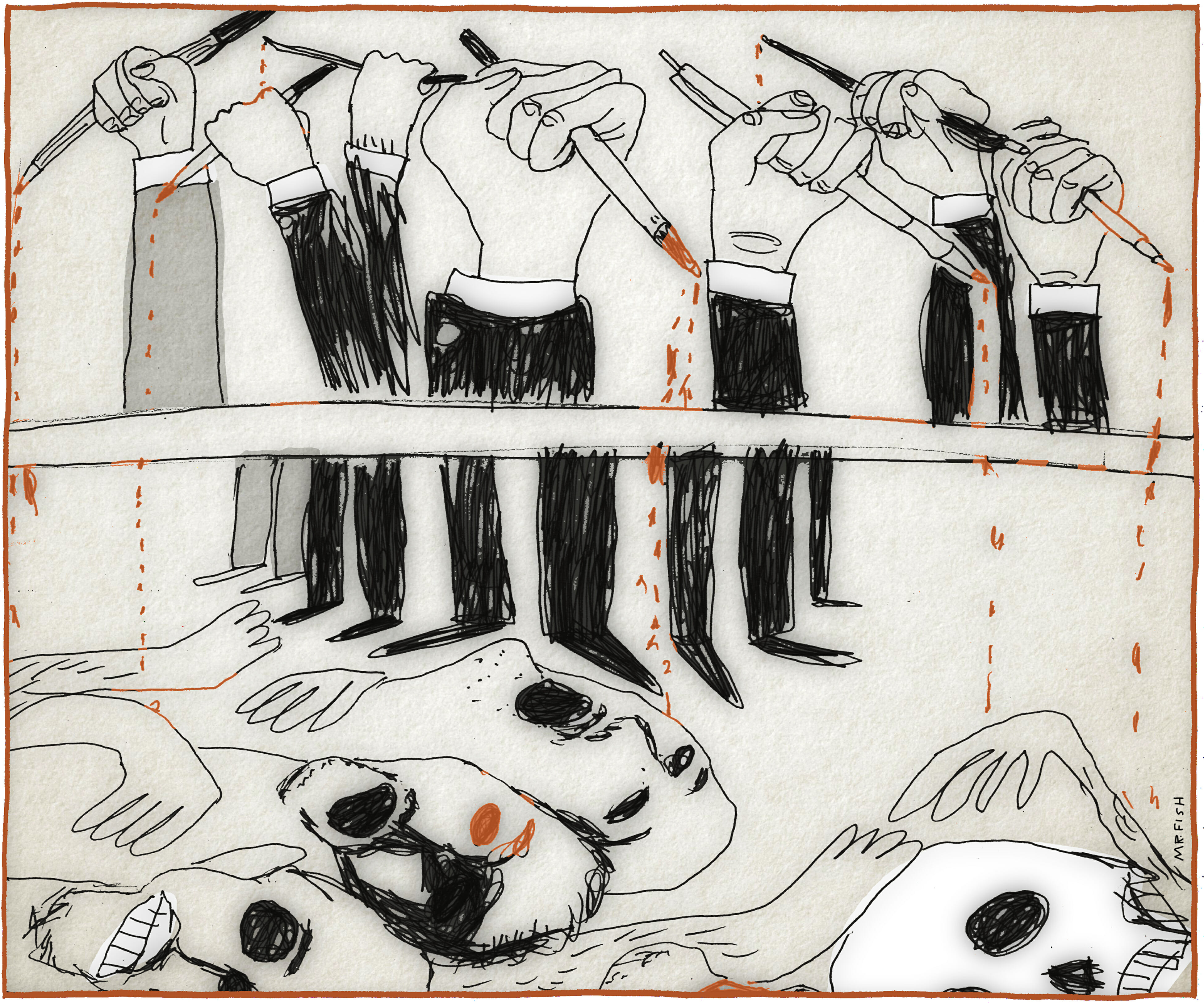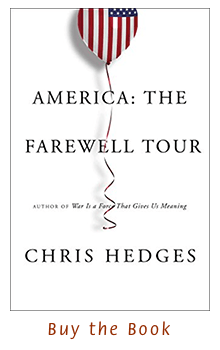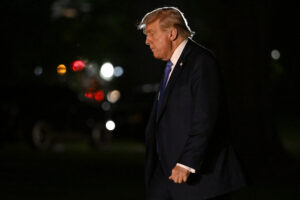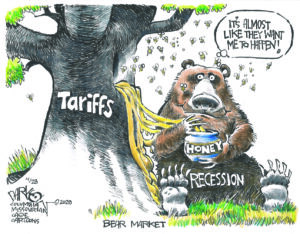American Anomie
In an era of "ruleless-ness," society opens the door to self-destructive pathologies and demagogues. Mr. Fish / Truthdig
Mr. Fish / Truthdig
The French sociologist Emile Durkheim in his classic book “On Suicide” examined the disintegration of social bonds that drive individuals and societies to personal and collective acts of self-destruction. He found that when social bonds are strong, individuals achieve a healthy balance between individual initiative and communal solidarity, which he called a “life-sustaining equilibrium.” These individuals and communities have the lowest rates of suicide. The individuals and societies most susceptible to self-destruction, he wrote, are those for whom these bonds, this equilibrium, have been shattered.
Societies are held together by a web of social bonds that give individuals a sense of being part of a collective and engaged in a project larger than the self. This collective expresses itself through rituals, such as elections and democratic participation or an appeal to patriotism, and shared national beliefs. The bonds provide meaning, a sense of purpose, status and dignity. They offer psychological protection from impending mortality and the meaninglessness that comes with being isolated and alone. The shattering of these bonds plunges individuals into deep psychological distress that leads ultimately to acts of self-annihilation. Durkheim called this state of hopelessness and despair anomie, which he defined as “ruleless-ness.”
Ruleless-ness means the norms that govern a society and create a sense of organic solidarity no longer function. The belief, for example, that if we work hard, obey the law and get a good education we can achieve stable employment, social status and mobility along with financial security becomes a lie. The old rules, imperfect and often untrue for poor people of color, nevertheless were not a complete fiction in the United States. They offered some Americans—especially those from the white working and middle class—modest social and economic advancement.
But the capture of political and economic power by the corporate elites, along with the redirecting of all institutions toward the further consolidation of their power and wealth, has broken the social bonds that held the American society together. This rupture has unleashed a widespread malaise Durkheim would have recognized.
“When society is strongly integrated,” he wrote, “it keeps individuals in a state of dependency, holding them to be in its service and consequently not permitting them to dispose of themselves as they wish. Society is thus opposed to them escaping from their obligations towards it through death. … The bond that attaches them to their common purpose attaches them to life; and, in any case, the high goal towards which their gaze is turned alleviates the suffering that they feel from life’s troubles. Finally, in a coherent and vital community, there is a continual exchange of ideas and feelings from all to each and from each to all which is like mutual moral support, so that the individual, instead of being reduced to his resources only, participates in the collective energy and draws on it when his own is exhausted.”
The reconfiguring of American society into an oligarchy and the collapse of our democratic institutions have left most of the population disempowered. The elites, predatory by nature, have discarded all restraint. “The state of disorganization, or anomie, is thus reinforced by the fact that passions are less disciplined at the very time when they need stronger discipline,” Durkheim noted of the avarice of the rich.
“It is not for nothing that so many religions have celebrated the benefits and the moral value of poverty,” Durkheim wrote. “This is because, of all schools, it is the one that best teaches man to restrain himself. By obliging us to exercise constant discipline over ourselves, it prepares us to accept collective discipline with docility, while wealth, by exalting the individual, constantly risks awakening the spirit of rebellion that is the very fount of immortality.”
The political process, as the research by professors Martin Gilens and Benjamin I. Page underscores, no longer advances the interests of the average citizen. It has turned the consent of the governed into a cruel joke. “The central point that emerges from our research is that economic elites and organized groups representing business interests have substantial independent impacts on U.S. government policy, while mass-based interest groups and average citizens have little or no independent influence.” This facade of democratic process eviscerates one of the primary social bonds in a democratic state and abolishes the vital shared belief that citizens have the power to govern themselves, that government exists to promote and protect their rights and interests.
The economic structures, like the political structures, have been reconfigured to mock the belief in a meritocracy and that hard work leads to a productive and valued role in society. American productivity, as The New York Times pointed out, has increased 77 percent since 1973 but hourly pay has grown only 12 percent. If the federal minimum wage was attached to productivity, the newspaper wrote, it would be more than $20 an hour now, not $7.25. Some 41.7 million workers, a third of the workforce, earn less than $12 an hour, and most of them do not have access to employer-sponsored health insurance. A decade after the 2008 financial meltdown, the Times wrote, the average middle class family’s net worth is more than $40,000 below what it was in 2007. The net worth of black families is down 40 percent, and for Latino families the figure has dropped 46 percent.
The economic disparity and political dysfunction have been exacerbated by the collapse of the judicial system, as Matt Taibbi writes in his book “The Divide: American Injustice in the Age of the Wealth Gap.” There is aggressive criminalization of the poor while the ruling elites are protected by high-priced lawyers and non-enforcement or rewriting of laws. Amid selective enforcement of laws in the ruleless society, the high rollers on Wall Street and in wealthy enclaves are not prosecuted for possessing and ingesting illegal drugs but the poor are thrown into prison and must forfeit all their property for being caught with small amounts of the same drugs. HSBC, the world’s seventh largest bank by total assets, after admitting to laundering $800 million for Central and South American drug cartels, was slapped with largely symbolic fines and a deferred prosecution agreement, which is the legal equivalent of a get-out-of-jail-free card. The poor, meanwhile, are hounded, arrested and fined for absurdly criminalized activities such as not mowing their lawns, loitering, selling loose cigarettes, carrying open containers of alcohol or “obstructing pedestrian traffic”—which means standing on a sidewalk. These fines are used to fill state and county budget shortfalls resulting from corporations and the wealthy fixing the rules to avoid paying meaningful taxes, if they pay taxes at all. This virtual tax boycott by the rich has broken yet another social bond, the idea that everyone contributes a significant portion of his or her income to make the society function.
The elites, who sacrifice nothing for society and are not held accountable for their criminal behavior, live in what Taibbi calls a “stateless archipelago.” They are empowered to pillage the nation, amass obscene wealth and wield unchecked political and legal control. The result has been the obliteration of the primary social bonds that, however biased in favor of the white majority, held the nation together.
The shattering of these bonds has left tens of millions of Americans adrift. Society, Durkheim wrote, is no longer “sufficiently present for individuals.” Those cast aside can participate in the society, as Durkheim wrote, only “through sadness.” The self-destructive pathologies that plague the United States—opioid addiction, morbid obesity, gambling, suicide, sexual sadism, hate groups and mass shootings—rise out of this anomie. My new book, “America: The Farewell Tour,” is an examination of these pathologies and the anomie that fuels these self-destructive behaviors.
Durkheim noted that the poor have lower rates of suicide. The poor know the rules are rigged against them. James Baldwin made much the same point when he wrote that African-American men are less prone to a midlife crisis than white men because they are less susceptible to the myth of the American Dream. Most African-Americans learn very early in life that there are two sets of rules. But white Americans, because of white supremacy, are more susceptible to the myth, and therefore more infuriated when that myth is exposed as a con. This, I suspect, is why nearly all mass shooters and members of right-wing hate groups, along with a majority of supporters of Donald Trump, are white men.
Capitalism, Durkheim wrote, is antithetical to creating and sustaining the relationships that are vital to social bonds. Capitalism rewards those for whom relationships are transactional and temporary. Relationships under capitalism are mercenary. They are part of the scheme for personal self-advancement and require the oily manipulation of others. To advance in a capitalist system it is necessary to build and then discard a series of ultimately hollow relationships. These empty relationships—and you can see them on display at any business gathering—contribute to the collective anomie and disintegration of social bonds.
Capitalism may cater to a natural desire among many for self-enrichment, but you don’t want this belief system to dominate society. Capitalism rewards single-minded narcissists and often con artists devoid of empathy and incapable of remorse. It rewards those focused exclusively on personal gain and self-aggrandizement. These dedicated capitalists often lack the capacity to form meaningful bonds, seeing in other people tools for commodification and exploitation. Once a capitalist class achieves complete control, as it has in the United States, it dismantles the structures that make social bonds possible, seeing in them an impediment to profit. The more concentrated wealth becomes, as with corporate capitalism, the more damage it inflicts on society, sending jobs to overseas sweatshops and leaving American workers underemployed or unemployed.
Karl Marx saw alienation as a positive force, one that estranged workers from the means of production and moved them to question the structures of power, educate themselves about their exploitation, and revolt. But for Durkheim this alienation, or anomie, is debilitating. It is, he wrote, “a collective asthenia” that drains us of energy and will. It manifests itself in self-loathing. We may indeed understand what is happening around us, Durkheim argued, but we lack the ability to free ourselves from the despair, frustration and rage that cripple our lives.
“Our actions require an object outside of themselves,” Durkheim wrote. “It is not because we need to sustain the illusion of some impossible immortality: it is because it is implicit in our moral being and it cannot be lost, even partially, without that moral being losing its reason for existence. There is no need to demonstrate that in such a state of collapse the slightest cause for depression can easily give rise to desperate acts. When life is not worth living, everything becomes a pretext for ridding ourselves of it.”
“For individuals are too closely involved in the life of society for it to be sick without their being affected,” Durkheim added. “Its suffering inevitably becomes theirs.”
President Trump is not a product of the theft of the Podesta emails, James Comey or racism—although he and many who support him are racists—or Russian bots. Demagogues arise from failed democracies plagued by ruleless-ness and anomie. They tell an enraged population what it wants to hear and crudely, to the delight of the betrayed, ridicule the elites who sold them out.
Removing Trump from office without confronting the ruleless-ness and anomie that define the lives of tens of millions of Americans would do nothing to restore democracy. In fact, it would probably consolidate the power of a Christianized fascism that cloaks itself in a cloying piety and false morality. Vice President Mike Pence, because he is a creature of the Christian right and has ingested its protofascist ideology, would probably be worse than Trump if he gained the presidency.
The left, like most critics of Trump, personalizes our decay. It focuses myopically on Trump, who is the symptom, not the disease. It spits back the thought-terminating clichés about the Russians stealing our elections while it refuses to examine the deep wounds within the society, wounds exacerbated when the Democratic Party under Bill Clinton sold out working men and women. If we do not heal these wounds, if we do not restore the social bonds shattered by predatory corporate capitalism, when the next financial crisis arrives—and it will arrive—this collective anomie will explode. Frightening demons, harnessing these dark, self-destructive pathologies, will rise from the depths of the ruleless morass.
* * *
See part one of Hugh Hamilton interviewing Chris Hedges about his new book, “America: The Farewell Tour” (via YouTube).
See part two of the interview in the panel below, also via YouTube.
Your support is crucial...
As we navigate an uncertain 2025, with a new administration questioning press freedoms, the risks are clear: our ability to report freely is under threat.
Your tax-deductible donation enables us to dig deeper, delivering fearless investigative reporting and analysis that exposes the reality beneath the headlines — without compromise.
Now is the time to take action. Stand with our courageous journalists. Donate today to protect a free press, uphold democracy and uncover the stories that need to be told.







You need to be a supporter to comment.
There are currently no responses to this article.
Be the first to respond.